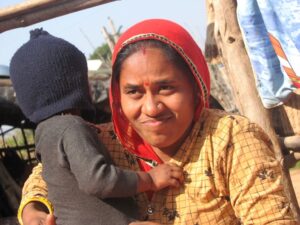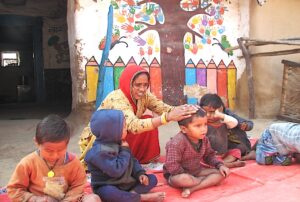It takes almost an hour to travel by car from Salumber district town to the Phulwari in Ghated. The road is not very good, but neither is it a dirt track – a tarred, winding road, never losing sight of the Aravali ranges.
“That is Mahadev Pahadi,” says Malaram ji, a community coordinator and my guide for the day, pointing at the huge mound on our left, looming against the bright blue sky. I can make out a white temple atop the flat top.
“ The government wanted to mine it for gold and silver, but the entire region was up in arms. We said it is our holy place hamara shraddhasthan hai! Even the local political leaders supported the people’s demand to protect the Pahadi,” Malaram ji continues.
“Then?”
“The government gave up … they are not touching it…at least not for the time
being.”
I am reminded of so many other struggles across the country, fought by local people to stop the government from destroying their age-old sacred mountains, rivers and groves by mining or some other development project.
Our destination arrives before I know it – a hamlet that seems empty of people. We walk through the narrow passage between two huts whose tiled roofs touched above our heads and here we were – standing outside the Phulwari, the daycare centre run by BHS. The sunny courtyard is full of children chasing each other, who settle down quickly when they see us, sitting cross-legged on a durree.
A young smiling woman steps forward to welcome us – this is Narbada Meena, in-charge of the daycare centre. It is around 9:30 a.m. and it is a busy time for her – she wipes clean the faces and hands of every child before oiling their hair and sends them off with a colleague for their morning snack of sattu. The Phulwari comprises of two rooms with brightly coloured walls – alphabets, numbers, birds, animals are painted on them, even the kitchen where the children gather for their bowl of breakfast has a nice big rainbow.
the daycare centre. It is around 9:30 a.m. and it is a busy time for her – she wipes clean the faces and hands of every child before oiling their hair and sends them off with a colleague for their morning snack of sattu. The Phulwari comprises of two rooms with brightly coloured walls – alphabets, numbers, birds, animals are painted on them, even the kitchen where the children gather for their bowl of breakfast has a nice big rainbow.
Narbada is in her late twenties and has two sons – the elder one is seven years old and the younger one is nearly two. Her husband used to work as a teacher in a private school but gave it up to prepare for entrance exams that would enable him to be selected for a government job – for now the family of four is dependent on Narbada’s income. In addition to taking care of the family and job, she is also studying to complete her B.A and her third-year exams are around the corner.
Although she belongs to a community in which girls’ education is often not a priority, fortunately her own family was different. Her father worked in Kuwait for fifteen years on various small jobs and even as a wage labour. His income was sufficient to ensure that Narbada and her two brothers completed school but before she could complete graduation, Narbada was married off just as she turned eighteen.
various small jobs and even as a wage labour. His income was sufficient to ensure that Narbada and her two brothers completed school but before she could complete graduation, Narbada was married off just as she turned eighteen.
It was illness that brought her in contact with AMRIT Clinics and Basic Healthcare Services. After she recovered, Sajju Didi who was a health worker at Ghated AMRIT clinic asked her whether she was educated. “I said yes, I have gone to school. And then she pulled me into the community work that the clinic had initiated.”
“I gathered people in the village and discussed with them the need for a Phulwari in the village. They were supportive because the government-run Anganwadi is across the nulla (stream) in Gameti hamlet. Our hamlet did not have an Anganwadi, and villagers did not send their children so far. I informed the clinic that our community had agreed and then they asked me to do a survey in the village for children up to five years of age. And after that BHS opened this Phulwari!”
In our conversation, interspersed with children running around, Narbada provides a rough sketch of community life in the area. The greatest problem, according to her, is that there is no remunerative work – people have to migrate and work as wage labour. The land holdings are tiny – her own family owns three bighas on which they grow wheat, corn and rice. Some other families grow chana, soyabean, urad and moong as well. Most families have tiny wadis where they grow vegetables – chili peppers, lady fingers, gawar, tomatoes, brinjals. Very few families own cattle and produce milk and yogurt. In spite of this variety of food, child malnutrition remains a problem. One of the main responsibilities of the Phulwari is to ensure that such malnourished children are taken care of. When she started out there were three children who were in the SAM (severe acute malnutrition) category, now there is only one. She points at a fat-cheeked boy, “Look! He used to be severely malnourished two years back, look at him now!”
There is a preference for sons which increases the size of families. “A family in our village had five girls but still the father wanted a son. People feel that only a son can take care of their fields, otherwise others will steal the land…encroach upon it. There was a time when parents did not send girls to school, but now they are ready to educate their daughters as well. This does not mean that dowry has come down…dowry is still high. The girl’s family can incur anything between a lakh and five lakh rupees as expenses for a marriage.”
“What is your greatest challenge in running this Phulwari?” I ask Narbada.
“The greatest challenge is to make the parents and families understand their jimmedari (responsibility) towards their children. Baap-ma ne bachchon par dhyan dene chahiye (parents must remain alert to the needs of their children). If the child is weak, they must learn how to feed them (khilane ka tareeka seekhna padega), they must take the effort to feed the child with care and take the child to the clinic for vaccinations. What can I tell you? When I started, the children would come without even washing their faces. Now, they are washed and their hair is combed. From July 2023 we decided to ask parents for Rs.100 per month because they must value the Phulwari – their children learn poems and songs, they play here, eat here – is Rs.100 too much for all this? Initially they were reluctant and I had to counsel a lot. Slowly, they are coming around. It is taking time.”
(responsibility) towards their children. Baap-ma ne bachchon par dhyan dene chahiye (parents must remain alert to the needs of their children). If the child is weak, they must learn how to feed them (khilane ka tareeka seekhna padega), they must take the effort to feed the child with care and take the child to the clinic for vaccinations. What can I tell you? When I started, the children would come without even washing their faces. Now, they are washed and their hair is combed. From July 2023 we decided to ask parents for Rs.100 per month because they must value the Phulwari – their children learn poems and songs, they play here, eat here – is Rs.100 too much for all this? Initially they were reluctant and I had to counsel a lot. Slowly, they are coming around. It is taking time.”
The children sit in a circle. A four-year-old stands up, raises both his hands and says, “Tayyar!” (Ready!). All the children raise their hands in reply, “Tayyar!!” Then he recites a poem, and his friends repeat after him.
It is difficult to even imagine the extent to which these children would lose out in terms of health and early childhood education if this Phulwari would not have existed.
Written by – Paromita Goswami
